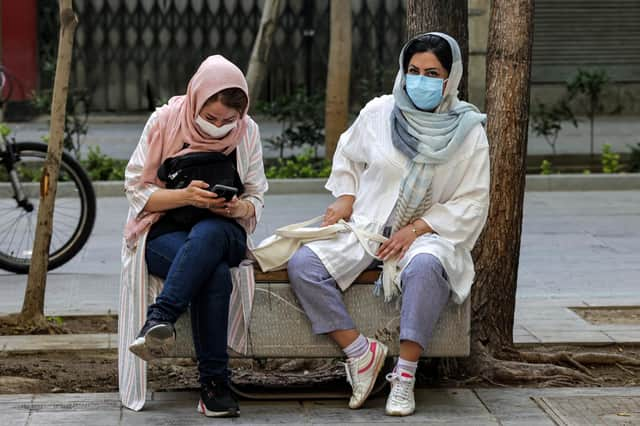Artists are often at the heart of movements for social justice and their work illuminates the commonalities and complexities of human experience.
By Soizig Carey
Thursday, 23rd June 2022

Women in Iran face a number of restrictions, with potential prison sentences for those who defy rules on artistic performance (Picture: Atta Kenare/AFP via Getty Images)
But artists are especially at risk of censorship, harassment, criminalisation and persecution when their work expresses ideas and possibilities that are denied by oppressive regimes. Their work demands freedom of expression and calls to others to speak out too. This can be dangerous work in today’s world.
One of the artists we work with at Scottish Refugee Council, Aref Ghorbani, is a classically trained musician and vocalist from Iran. In his home country, artists and cultural events require permits from the Culture and Islamic Guidance Ministry, which has the authority to cancel anything deemed immoral.
Despite the threat of jail for defying government restrictions on women performing, Ghorbani sought collaboration with women musicians. He organised and performed an unpermitted concert alongside women singers to an audience of 600, predominately women. He felt sick, but did it anyway.
Because of this and other prominent underground activities, he had to flee his country. Ghorbani is now settled in Scotland and will perform as part of Refuge at the Edinburgh International Festival.
Refuge is a series of contemporary theatre, dance, visual art, film and conversation, including artists who found themselves uprooted and now live in Scotland. The programme weaves together perspectives of artists who have taken different journeys, journeys that remind us people are often carrying more than we can see or know. Artists especially are always listening, questioning and making; these are exceptional minds.
Read MoreUkraine-Russia conflict: Ukrainian poet who crossed border to appear at Scottish...
Leena Nammari is an artist and printmaker whose installation It Will Live will greet audiences as they visit The Studio. “My work has predominantly been reflecting quietly on the Palestinian condition of statehood or lack thereof, from a small individual domestic setting. I am an artist who is a storyteller, a truth-teller. It is my job to voice, to prod, to allow others to reflect, without slogans or propaganda the human condition, and in particular marginalised voices,” she said.
Nammari has been settled in Scotland for a long time, but in many ways has never left Palestine.
Sabir Zazai, Scottish Refugee Council’s chief executive, knows this feeling all too well, as well as the significant role that artists have in truth and storytelling, in building an open-hearted culture. “This has been a year of terrible stories. War in Ukraine, unrest in Afghanistan, families stranded and separated by bureaucracy, Rwandan detention centres and people left with no option but to risk their lives on dangerous journeys in a desperate bid to reach a place of safety,” he said.
“In this relentless fight for human rights and freedoms, we must not forget to reflect on hard-won triumphs... Had Rudolph Bing not sought and been granted refugee protection here 75 years ago, this world-class festival may not exist. The cultural fabric of Scotland would be very different. We are in awe of his legacy, and of the exceptional artists performing as part of Refuge.”
We hope audiences will be moved and inspired by this programme, and that they will leave with a greater understanding of what it means to be uprooted in today’s world.
Soizig Carey is arts and cultural development officer at Scottish Refugee Council. Refuge runs from August 12 to 27. See www.eif.co.uk for further details
No comments:
Post a Comment